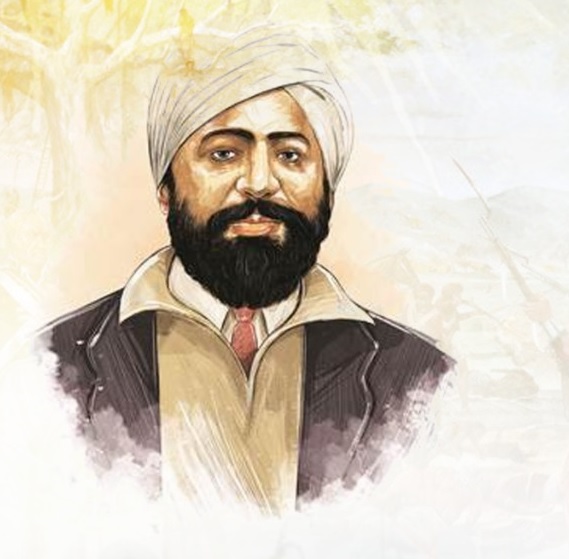
-Ananth Seth
This write-up is not going to be a biographical essay about Balidaani Udham Singh or an Information Capsule on his commendable act. Any internet search engine would let us know that Udham Singh was the great son of Maa Bharti who avenged Jalianwala Bagh massacre by assassinating Michael Francis O’Dwyer, the former Governor of Punjab who had supported the heinous massacre by General Reginald Dyer. Rather, the discussion here will be on the proverbial killer instinct, or rather the alleged absence of it, of Bhartis. The use of the word Bharti here is a conscious and well concerted choice, the reference being to followers of Hindutva, Sikhism, Jainism and Buddhism and on the issues concerning them and their religiosity.
Udham Singh’s act of avenging the massacre is one of the very few reported and chronicled events of a Bharti getting even, in his own way, with the perpetrators of crimes against Bhartis. Though sacrifices like that of Guru Tegh Bahadur and acts of brave-hearts like Bhagat Singh, Chandrashekhar Azad, Raj Guru et al do come to my mind when we talk of ‘revenge’, such acts (or may be the chronicling of such acts) have been few and far between. The narrative that has developed (or has been developed, probably with malicious intent by some powerful vested interests) is that when we are asked to choose between caution and audaciousness, the former should prevail and that lot of premium should be placed on peace. It is nobody’s contention that Caution per se is bad in itself. But Caution beyond a particular threshold and especially in civilizational contexts, should not be projected as a virtue.
Bharti literature in general and historical Bharti literature in particular is replete with mentions and instances where clemency, non-violence and lenience have been projected and praised as virtues of higher order. A Prithviraj Chavan pardons an Islamic marauder eight times (twenty times, according to Prabandha Kosha and 21 times, according to Prabandha Chintamani!) only to get defeated and blinded later. More recently, despite having about a Lakh POWs from Pakistan after the 1971 War, India let go of the opportunity to settle PoJK issue. Our children are fed the opium that it was Gandhi’s non-violent methods which got us freedom. That it was Bose’s forceful ways which made the British rethink, has been hushed up. There are many more such instances where softer or rank illogical actions have been glorified or undue emphasis has been placed on moral and ethical correctness even with respect to politico-civilizational pursuits.
We take pride in stating that we never attacked anyone; we say it with a sense of righteousness that Hindutva has never been a proselytizing religion. Should we really be gloating over these ‘realities’? Despite being the Sanatana (Eternal) Dharma, Hindutva today is only the third largest (and the least spread-out) religion and even that is so because India is the second most populous country and about ninety four percent of World’s Hindus reside in India. There is nothing called ‘Organization of Hindu Countries’; in fact, there is no ‘Hindu Country’ as such. Despite being a Hindu majority country, it has taken us about 500 years to correct a civilizational humiliation and even that has come after a protracted legal battle. Yes Sir, I am indeed talking of the Ram Mandir issue. Let us not forget that it was not just in Ayodhya that a Hindu Temple was desecrated or demolished. There are thousands of temples which were destroyed and mosques or other religious structures erected over them. And what did we do to correct that: we enacted ‘The Places of Worship (Special Provisions) Act’ to protect those illegal structures which are living symbols of the humiliation we have faced over generations because of our obsession with Peace, Pacifism and may be because of casteism, regionalism and linguistic chauvinism too (an aside: our obsession with diversity also needs to be debated…but some other day). We don’t stop at that…we name our cities, towns, roads and streets after the marauders who humiliated us and who tried to erase our Sanatan Heritage. This is not all; we go a step ahead and vote, time and again, for an entity which brands assertive nationalistic pride as jingoism. What a shame!
Udham Singh’s martyrdom day is an occasion and an opportunity to discuss and ruminate upon the points raised in the foregoing paragraphs. One might argue that since history is written by victors, the Hindu psyche should not be blamed for our perceived softness. Point acknowledged and noted. But, why were we the losers and why did the ‘victors’ get the chance and opportunity to write our history? Above all, why are we persisting with that version of history which paints us in grey? These are questions which merit careful and profound answers. How we answer these questions would decide what history our coming generations read and what imprint our coming generations leave on history.
May Udham Singh’s heroic legacy inspire us to become more assertive and more proud of our religion, culture and civilization. May it make our Killer Instinct (of course, the proverbial one) stronger.
-Author is Hyderabad-based Legal Practitioner
This Article First Published On 26-Dec-2020














